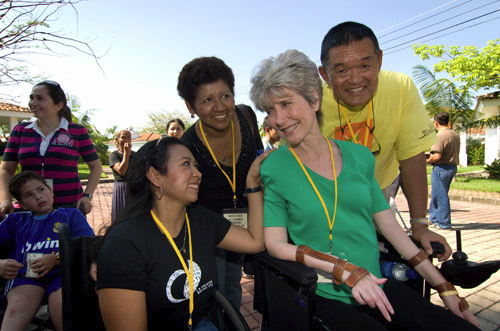Image from Joni & Friends
The Columbus Dispatch profiles how several churches provide worship with and for parishioners who have disabilities. Some of the ways that these churches serve their congregations include:
- Headphones to reduce sensory overload during service for people with cognitive disabilities.
- Including and acknowledging the outburst of a child on the autism spectrum during liturgy.
- Kneeling to speak to people who are in wheelchairs.
- Asking people with disabilities how they’d like to be included, instead of assigning them tasks.
- Hearing assistance systems, large print bulletins, and other assistive technology for people who can’t see or hear well.
- Professional Sign Language interpreters or services conducted entirely in American Sign Language.
The article notes that church attendance is significantly lower for people with disabilities, and suggests it may be because they are neither welcomed nor included in all communities of faith.
From the Dispatch:
While 57 percent of people without disabilities attend religious services at least once a month, so do 50 percent of people with disabilities, according to a 2010 Kessler Foundation Survey by Harris Interactive. For people with somewhat or very severe disabilities, the attendance rate is 46 percent.
The focus of the article is Debra Petermann, church-relations program manager for the Ohio office of Joni and Friends International Disability Center. She was drawn to this work in response to a childhood experience of seeing her brother excluded from their church because of his severe cognitive disability; the family left the community of faith as a result.
The article later notes that this is a common experience for the families of people with disabilities.
Again, from the Dispatch:
But if one child in a family has a disability such as autism and is made to feel unwelcome during services, then 100 percent of the family members will feel unwelcome, said Esther Kaltmann, who co-directs the Lori Schottenstein Chabad Center in New Albany with her husband, Rabbi Areyah Kaltmann.
Have you felt unwelcome or excluded from a church because of medical issues? What should churches be doing to lead the way in ministering to people who are excluded from much of society?
Posted by David Streever

